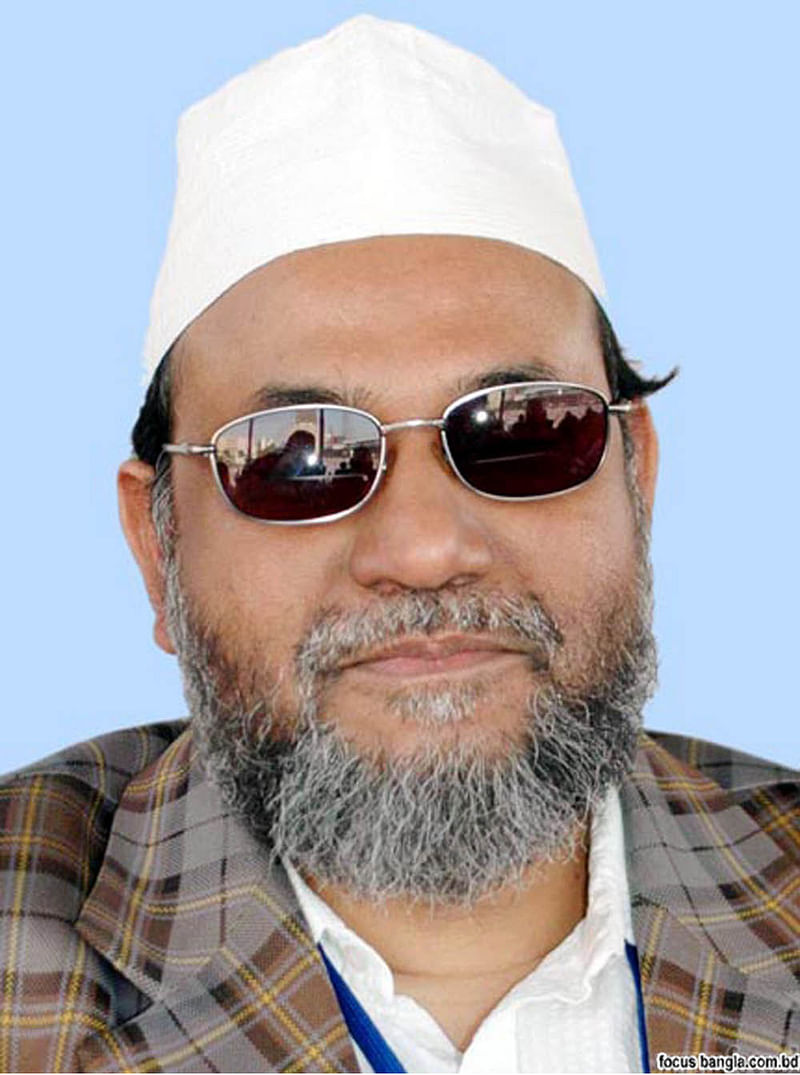Mir Quasem walks to gallows

Jamaat-e-Islami executive committee member Mir Quasem Ali was executed tonight (Saturday night) at Kashimpur jail in Gazipur.
Known as the financier of his party, 63-year-old Quasem was executed for committing crimes against humanity during the liberation war in 1971.
Quasem was hanged at 10:35pm, inspector general of police AKM Shahidul Hoque told the Prothom Alo.
Before the execution, the authorities called the family members of Quasem to meet him inside the jail for the last time and accordingly some 40 to 45 family members met him.
Talking to reporters after coming out of the jail, Mir Quasem’s wife Khandaker Ayesha Khatun said his husband told her that he was informed about his execution and he was not afraid of death.
She said Mir Quasem will be buried in his ancestral village in Manikganj.
He is the sixth of such convicts who were executed after being awarded with death penalty on charge of crimes against humanity during the 1971 liberation war.
Following exhaustion of all legal procedures, the authorities issued the execution order on Saturday the day after Quasem reportedly informed the authorities that he will not seek presidential clemency although he earlier had said that he will take a decision on seeking clemency on after meeting his missing son.
Mir Ahmed Bin Quasem, Quasem Ali’s son and a member of his legal defence team, was said to have been picked up without a warrant by men in plainclothes on 9 August.
On 30 August, the Appellate Division of Supreme Court rejected Quasem’s review petition, the last phase of the legal procedures, upholding his death penalty originally given by the International Crimes Tribunal, Bangladesh (ICT,B).
The ICT,B sentenced Mir Quasem Ali to death on 2 November 2014 on charge of crimes against humanity including murder, rape and arson that occurred during the country's war of independence in 1971.
Attorney general Mahbubey Alam, in an instant reaction to the rejection of Quasem’s plea, said the judgment relieved him as Quasem Ali received what he actually deserved.
However, Quasem’s chief defence counsel Khandaker Mahbub Hossain told reporters, "The court has delivered the verdict based on false witnesses and evidences."
"The court had no other choice. The law is formulated in a way that it somewhat forces [the court] to accept hearsay as evidence."
His party, Jamaat-e-Islami, alleged that Mir Quasem was denied justice and was sentenced ostensibly to obliterate the leadership of the opposition party.
Amnesty International has termed the trial ‘unfair’ and ‘flawed’ and had urged the Bangladesh authorities to halt execution.
New York-based rights organisation Human Rights Watch echoed the AI and had called on Dhaka to stop the execution.
While hearing Quasem Ali’s appeal, chief justice Surendra Kumar Sinha once criticised the attorney general, prosecutors, and investigators for producing insufficient evidence in the trial court.
Food minister Qamrul Islam and liberation war affairs minister AKM Mozammel Huq had demanded resignation of the chief justice for his reported remarks that ‘the prosecution is doing politics with the trial of death row convict Mir Quasem Ali’.
They made the demand at a roundtable discussion organised by Ekattorer Ghatak Dalal Nirmul Committee in the city on 5 March.
Later on 27 March, the Supreme Court fined ministers-Qamrul Islam and AKM Mozammel Huq-Tk 50,000 each for their controversial comments about chief justice.
In its full verdict released on 1 Septmber, the SC observed that the two ministers violated their oaths of office to preserve, protect and defend the constitution.
The police arrested Mir Quasem on 17 Jun 2013, in the office of newspaper Naya Diganta, less than two hours after the tribunal had issued a warrant for his arrest.
He was indicted on 5 September 2014 and found guilty in November the same year.
The court 2 of The International Crimes Tribunal, Bangladesh (ICT,B) sentenced Mir Quasem Ali to death on 2 November 2014 on charge of crimes against humanity including murder, rape and arson occurred during the 1971 liberation war.
On 30 November 2014, Quasem filed an appeal before the Supreme Court challenging the death penalty but the Appellate Division of Supreme Court on 8 March upheld the death penalty for him.
Later, he filed another petition with the Appellate Division seeking review of the judgement.
The Appellate Division of the Supreme Court on 30 August rejected Quasem’s review petition, upholding the death penalty for him for the 1971 crimes against humanity.
Mir Quasem, who is said to be the top financier to Jamaat-e-Islami party, is the sixth such convict, who was hanged after being awarded with death sentence by the International Crimes Tribunal, Bangladesh (ICT,B).
Before Quasem walked to the gallows Saturday, four of his senior party colleagues and one senior leader of his party’s alliance partner BNP were executed in the past three years on similar charges, beginning in December 2013.
Jamaat-e-Islami party chief Matiur Rahman Nizami, also a former minister, was executed on 11 May this year.
Earlier on 22 November 2015, two former ministers-BNP standing committee member Salauddin Quader Chowdhury and Jamaat-e-Islami secretary general Ali Ahsan Mohammad Mojaheed were executed.
Before them, Jamaat’s assistant secretary general Muhammad Kamaruzzaman was executed on 11 April 2015. Another assistant secretary general of Jamaat Abdul Kader Molla was executed on 12 December 2013 on the same charge.
Jamaat, however, claimed all along that the trial process was flawed and its leaders have been made victims of political vendetta.